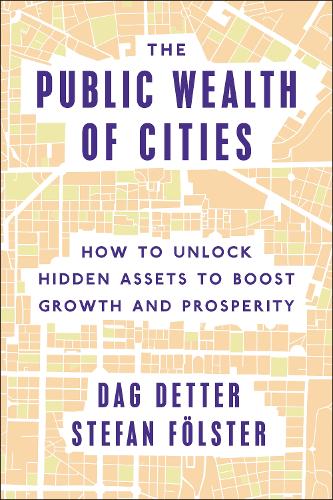
The Public Wealth of Cities: How to Unlock Hidden Assets to Boost Growth and Prosperity
(Hardback)
Publishing Details
The Public Wealth of Cities: How to Unlock Hidden Assets to Boost Growth and Prosperity
By (Author) Dag Detter
By (author) Stefan Folster
Bloomsbury Publishing PLC
Brookings Institution
17th August 2017
United States
Classifications
Professional and Scholarly
Non Fiction
Public finance and taxation
Urban and municipal planning and policy
336.091732
Physical Properties
Hardback
271
Width 160mm, Height 235mm, Spine 23mm
585g
Description
Crumbling streets and bridges. Poorly performing schools and inadequate social services. These are common complaints in cities, which too often struggle just to keep the lights on, much less make the longterm investments necessary for future generations. It doesnt have to be this way. This book by two internationally recognized experts in public finance describes a new way of restoring economic vitality and financial stability to cities, using steps that already have been proven remarkably successful.
Reviews
Cities are the locomotives of economic progress. But not all cities are successful. This fascinating and important book has divided them into the treadmill towns that fail and the turbo-cities that succeed. The difference, argue the authors, is that successful cities focus intelligently on developing their long-term assets. They build economic, social, and human wealth.Martin Wolf, Financial Times
In terms of the ideas presented, I loved the book. It touches on the organizational challenges of getting municipal finance right while speaking to what execution has to look like as well. It also moves us beyond a discussion limited to taxation and into a conversation about how municipal authorities can claw back some of the value they create, the same as wed expect any firm in the private sector to do; and in so doing, it offers sustainable ways to fund those functions that wont make money, but that wed like to see supported all the same.Jeff Fong, Market Urbanism
Drawing on the successes and failures of cities around the world and applying exemplary analysis, Detter and Flster uncover a treasure trove of hidden urban assets. Transparent, accountable, and professional governance of the economic, social, and human assets of our cities is achievable. A must-read for all mayors, city counsellors and those who elect them.Willem Buiter, Chief Economist, Citibank
The authors offer pragmatic solutions, linking better outcomes to asset management practices and new definitions of social capital that promote evidence-based investments. The strategy: identify your economic, social, and human assets; professionally manage assets; and instead of show casing current interests or putting out fires, make long-term investments. With examples and toolkits, The Public Wealth of Cities helps local leaders see our real responsibility: not to produce and manage public wealth but to advocate for residents served by it. Of course, money matters, but not as much as our will to collaborate across sectors in order to govern public resources well and improve lives.Ben McAdams, Salt Lake County (Utah) Mayor
Across the globe, people are flocking to cities. But some cities are thriving and others arent. As the process of urbanization continues, its crucial to understand why some cities succeed and others dont. In this important and practical new book, Detter and Flster teach us how to turn around distressed cities.Peter Orszag, Vice Chairman of Investment Banking, Lazard, and former Director, Congressional Budget Office
How do we deploy our public assetsour balance sheetto meet critical social, human, and economic challenges How do we finance these assets in an economically feasible, politically defensible way How do we move beyond the essentialunassailable accountabilityto our ultimate goal, expanding our metro economic engines In Public Wealth of Cities Detter and Flster take the lessons from their earlier work and apply them at the local level, where creativity and innovation are essential and where both the potential promise and pitfalls of government action are in stark relief.Anthony Williams, former Mayor, Washington, D.C.
This is an important book. Detter and Flster have introduced an innovative approach to solving some of the most egregious problems that cities face today. As the worlds population grows, some cities will be forced to adapt while others will founder. Identifying a citys assets, improving management, and shifting resources from consumption to long-term investment make inherent sense and warrant close attention as a means to improve the quality of city life and standards of living.Fergus J. McCormick, Chief Economist, DBRS, Inc.
Author Bio
Bruce Katz is the cofounder of New Localism Advisors and was the Centennial Scholar at the Brookings Institution, where he focused on the challenges and opportunities of global urbanization. He was vice president and codirector of the Brookings Metropolitan Policy Program, which he founded in 1996. He coauthored The Metropolitan Revolution (Brookings, 2013).
Jeremy Nowak was the cofounder of New Localism Advisors and a Distinguished Visiting Fellow at Drexel University's Lindy Institute for Urban Innovation. He created The Reinvestment Fund, one of the largest community investment institutions in the United States, and chaired the Board of the Federal Reserve Bank of Philadelphia.
Dag Detter is Managing Director of Detter & Co, specializing in unlocking public wealth. Previously he was the President of Stattum, the Swedish government holding company, and Director of State Enterprises at the Ministry of Industry.
Stefan Flster is Director of the Reform Institute in Sweden and Associate Professor of economics at the Royal Institute of Technology, in Stockholm. He has been the chief economist at the Confederation of Swedish Enterprise, and the author of many books on economic growth and social developments.
Detter and Flster are the authors of The Public Wealth of Nations, named by both The Economist and The Financial Times as among the best books of 2015.
